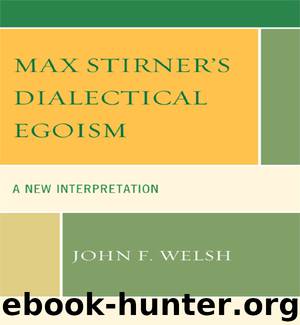Max Stirner's Dialectical Egoism by John F. Welsh

Author:John F. Welsh [WELSH, JOHN F.]
Language: eng
Format: epub
ISBN: 978-0-7391-4157-1
Publisher: Lexington Books
Revolution
Tucker’s writings advocated for a fundamental transformation of American society based on the labor theory of value and equal liberty. Tucker’s individualist anarchism is a revolutionary philosophy in the sense that it propounds radical or fundamental change in everyday life, in culture and ideology, and at more macro levels of society, economy, and polity. However, Tucker argued against revolution on many occasions as a strategy for political change because of its close association with the violent and authoritarian organizations and movements of the socialists and the communists. Although he was supportive of the First International and subsequent efforts to build a labor movement, Tucker argued that the Marxist revolutionary organizations and movements would do little more than reinforce the power of the state over society and individuals, thus reinstitutionalizing the principle of organizing social life through coercion. He thought it was absurd that socialist theory and practice would lead to a stateless society. “What Marx meant by the state is evident from the fact that his plan involved the establishment and maintenance of socialism—that is, the seizure of capital and public administration—by authoritative power.” “It is this dependence of Marx’s system upon authority” that prompted Tucker’s argument against the revolutionary movements of his time.50
The idea of revolution in the late nineteenth and early twentieth century was premised upon the use of coercion by a hierarchically organized revolutionary organization that would lead collective action against the capitalist class. Once the capitalist class had been overthrown, the subsequent transformation of society would also be led by a revolutionary elite, which would now wield state power. The idea of hierarchically organized collective action against capitalists and the seizure of state power are both contrary to the basic philosophic stance of anarchism. Tucker commented on various occasions that among the anarchists, only the anarcho-communists, such as Peter Kropotkin, Johann Most, and Emma Goldman, argued for revolutionary change in the same way as the Marxists and state socialists. The basic difference between the state socialists and the anarcho-communists was that the latter said they did not want to seize state power, but to destroy the state just as they appropriated capital. For Tucker, this was a contradiction since the appropriation of private property is based on the need to have an agent using force on behalf of the collectivity. The more individualist-oriented anarchists worked for self-liberation or social change through other means because they were unwilling to accept the coercion and discipline that characterized revolutionary movements. As far as Tucker was concerned there was no “half-way house between state socialism and anarchism.”51 Just as the anarchists rejected the state socialist vision of society, they also opposed the political means sought by Marx and the state socialists.
In the 1880s, long before the success of the Bolshevik Revolution in Russia, Tucker opposed revolution as a political strategy on the grounds that he believed it could not succeed militarily, especially for those movements that sought to promote both liberty and decentralization. In an 1881 essay on the anti-imperial
Download
This site does not store any files on its server. We only index and link to content provided by other sites. Please contact the content providers to delete copyright contents if any and email us, we'll remove relevant links or contents immediately.
The Secret History by Donna Tartt(16611)
The Social Justice Warrior Handbook by Lisa De Pasquale(11486)
Thirteen Reasons Why by Jay Asher(7783)
This Is How You Lose Her by Junot Diaz(5754)
Weapons of Math Destruction by Cathy O'Neil(5032)
Zero to One by Peter Thiel(4818)
The Myth of the Strong Leader by Archie Brown(4786)
Promise Me, Dad by Joe Biden(4441)
Stone's Rules by Roger Stone(4413)
Beartown by Fredrik Backman(4406)
How Democracies Die by Steven Levitsky & Daniel Ziblatt(4393)
The Fire Next Time by James Baldwin(4338)
100 Deadly Skills by Clint Emerson(4072)
A Higher Loyalty: Truth, Lies, and Leadership by James Comey(4027)
Rise and Kill First by Ronen Bergman(4009)
The David Icke Guide to the Global Conspiracy (and how to end it) by David Icke(3876)
The Farm by Tom Rob Smith(3870)
Secrecy World by Jake Bernstein(3774)
The Doomsday Machine by Daniel Ellsberg(3726)
